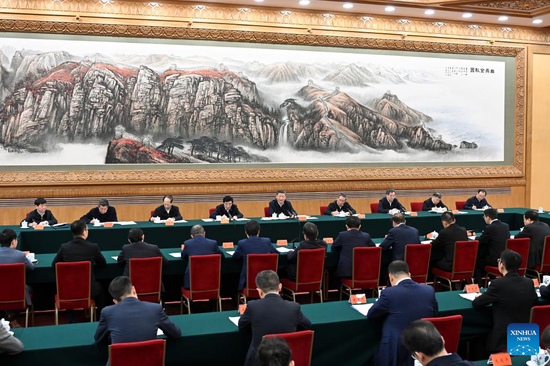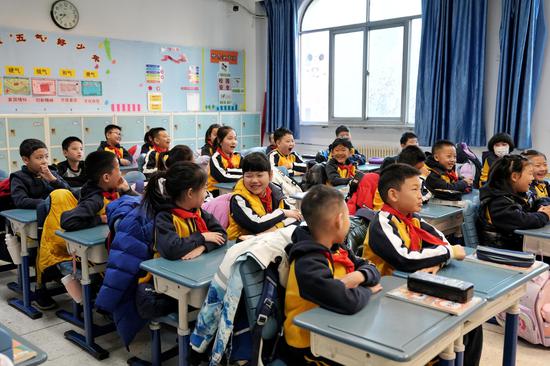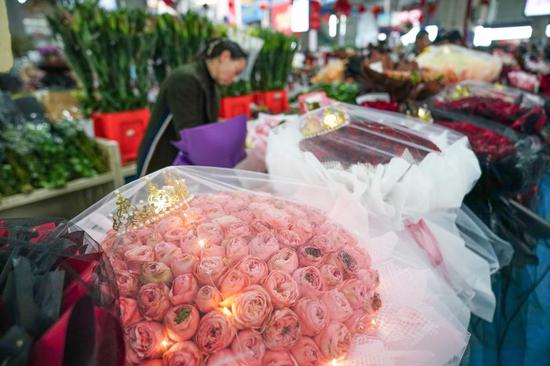
An employee (left) introduces trade-in policies for home appliances to a shopper at a department store in Wuzhou, Guangxi Zhuang autonomous region. (HE HUAWEN/FOR CHINA DAILY)
China has vowed greater efforts to boost consumption, with a focus on increasing household disposable incomes, enhancing the supply side and fostering a conducive policy ecosystem, which analysts said will shore up the country's growth momentum in the face of external uncertainties.
Earlier this month, at an executive meeting of the State Council — the country's Cabinet — policymakers elevated stimulating consumption to top priority status amid efforts to sustain robust domestic economic circulation.
Information collected during the recently concluded Spring Festival holiday suggests that while consumers are gradually regaining their spending appetites, they remain cautious in their purchasing decisions.
The Ministry of Culture and Tourism said the number of domestic trips taken during the holiday increased 5.9 percent compared to the previous year's break and were a robust 26 percent higher than the same period in 2019, which was prior to the COVID-19 pandemic.
Furthermore, total spending on domestic tourism grew 7 percent year-on-year, a 15.2 percent increase compared to the 2019 Spring Festival holiday. That said, average percapita tourism spending during this year's Spring Festival holiday reached only around 90 percent of 2019 levels, a performance that fell short of the more robust recoveries seen during the Mid-Autumn Festival and National Day holidays last year, said China Chengxin International Credit Rating Co Ltd.
The essential recipe to unlock the potential of China's consumer market lies in income-boosting initiatives, which were highlighted during the State Council meeting.
China should ramp up countercyclical measures such as interest rate cuts, reserve requirement ratio reductions and increased fiscal spending so as to bolster corporate profitability and, by extension, household earnings, said Su Jian, director of the national center for economic research at Peking University.
Meanwhile, with the country's dedicated efforts to support the recovery of the property sector and stock market, the resulting gains in household wealth will provide a direct boost to consumer confidence and spending power, Su said.
Consumption is poised to contribute 70-80 percent to China's economic growth this year, said Su, who added that achieving this level of consumption-driven growth will require the government to deploy a comprehensive policy toolkit — including consumer voucher programs — to rapidly stimulate consumer demand.
As incomes rise and consumer preferences evolve, demand for premium products and services is expected to grow. By enhancing the quality and variety of offerings, China can stimulate new consumer demand and unlock untapped market potential, said Yuan Haixia, executive dean of the research institute at CCXI.
China's demographic trends, characterized by a rapidly aging population and changing family structures, are creating new consumption opportunities in healthcare, senior care, education and other service sectors, Yuan said.
The rapid development of cutting-edge technologies such as the metaverse and artificial intelligence is reshaping China's consumption landscape, injecting fresh momentum into the economy, Yuan added.
A number of major automakers in China, such as Geely and Dongfeng Motor, have integrated artificial intelligence startup DeepSeek's popular large language model into their own systems, shifting the focus of their competition from autonomous driving to intelligent onboard experiences.
In addition, by enhancing the breadth and depth of the social safety net, the government can effectively reduce the motivation for precautionary savings among households. This, in turn, will free up more disposable income for consumption, driving a virtuous cycle of economic growth, analysts said.
Although China has steadily expanded the coverage of its social security net in recent years, the system still lags behind the standards of developed nations like the United States and Japan, Yuan said.
When it comes to areas like healthcare and pension support, the burden on rural and low-income populations remains heavy, dampening their sense of security, as well as spending appetites. And by directing more fiscal resources into sectors such as healthcare, education, employment and childcare, China can build a more sound social safety net to alleviate the financial burdens faced by households, thereby enhancing their overall consumption capabilities, Yuan added.


















































 京公網安備 11010202009201號
京公網安備 11010202009201號